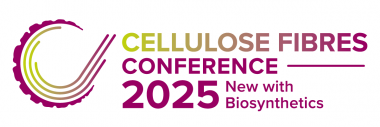Cellulose Fibres Conference 2025: Call for Abstracts
Latest developments in the sustainable textile industry will be introduced and discussed at the “Cellulose Fibres Conference 2025 – New with Biosynthetics” in Cologne, Germany and online, on 12-13 March 2025. Abstract submission is now open.
In 2024, 214 participants enjoyed two conference days in Cologne or online. The highlights were 40 presentations with lively panel discussions afterwards, the innovation award “Cellulose Fibre Innovation of the Year”, an exhibition, the poster session and plenty of networking possibilities. All of this will be repeated in 2025, including new topics, new speakers and new inputs. The “Cellulose Fibres Conference 2025” will again cover the entire value chain, from lignocellulose, chemical pulp, cellulose fibres such as rayon, viscose, modal or lyocell and new developments to a wide range of applications, e.g. textiles from renewable fibres, nonwovens such as wet wipes and composites, hygiene and packaging. The conference will further address topics like circular economy, fibre-to-fibre recycling and sustainable carbon cycles, biosynthetics, new technologies and feedstocks.
Call for Abstracts
Enterprises and research institutes are invited to contribute to the program and present their innovative products, technologies or developments. Deadline for submission is 30 September 2024.
cellulose-fibres.eu/call-for-abstracts
Call for Innovations
The conference will conclude with the innovation award “Cellulose Fibre Innovation 2025” whose winner can join the ranks of amazing innovations. The deadline for innovation submissions is 30 November 2024. The innovation award “Cellulose Fibre Innovation of the Year 2025” is sponsored by GIG Karasek.
cellulose-fibres.eu/award-application
Call for posters
The poster exhibition is highly anticipated event at the conference. Poster submissions are open until 31 January 2025.
cellulose-fibres.eu/call-for-posters
nova-Institut GmbH








